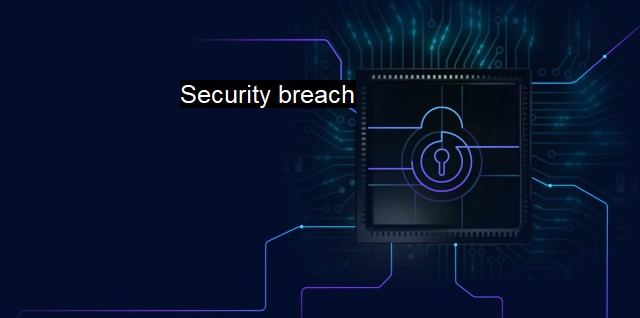What is Security breach?
The Impact of Security Breaches on Cybersecurity in the Digital Age: Protecting Sensitive Information and Maintaining Reputation
A security breach, within the context of cyber security and antivirus systems, refers to a circumstance where an unauthorized party, often classified as a hacker or attacker, attempts to exploit vulnerabilities in a network or system to bypass security measures and access confidential or control critical data or information. The intentions of these unauthorized parties might vary, from pure malicious intent to merely demonstrating their technical skills, but the resulting actions always yield detrimental consequences compromising the safety of sensitive information.Generally, breaches have the potential to lead to data loss, downtime, financial loss, along with productive time waisted and damage to the reputation of the concerned organization. Therefore, preventive measures are famous for providing a significant line of defense to mitigate the risks associated with security breaches.
The increasing prevalence of digital technology in day-to-day life has subsequently heightened the risk of security breaches. From personal data on smartphones to confidential business files on corporate servers, the amount of sensitive information on digital devices continues to grow. As network intrusions have become more sophisticated, both private and governmental organizations have been deploying resources to develop advance protective mechanisms – which typically blends aspects of antivirus and cyber security protocols.
Antivirus systems serve as the first line of defense against security breaches. These systems continually monitor a device for any malicious or suspicious activities, alerting the user and neutralizing threats when detected. antivirus systems interfere, discontinue and delete any form of external threat such as viruses, malware, Trojan horses, and other malicious software designed to compromise data security.
Due to increasing advanced techniques deployed by hackers and attackers, antivirus systems alone may no longer guarantee total security in today’s congested digital space. Hence, cybersecurity has become an essential measure to protect information. Cybersecurity leverages a system-wide approach, encompassing an array of strategies that extend protection beyond simply negating external threats.
Whereas antivirus systems primarily provide defense at the device or network level, cybersecurity extends protection to the user level. It considers all aspects of security – physical, internal and external -, providing comprehensive security protocols and measures. Cybersecurity initiatives and operations, like advanced threat protection, data loss prevention, and network monitoring, contribute to filling the gaps left by traditional antivirus systems, thereby creating a more fortified barrier against a possible security breach.
Despite these protective measures, security breaches do occur. Not only due to an inability of systems but also due to the adept skills of hackers continually evolving their techniques to remain a step ahead of countermeasures. Once recognized, the critical task following any successful breach is identifying the extent of vulnerability exploited, the incurred actions taken, as well as examining and repairing the affected areas using a thorough, rigorous process called penetration testing or "pen-testing".
The attacker's objective is deciphered during this rigorous exercise, the details of which are utilized to adjust the security system. Besides, innovative algorithms and artificial intelligence are assisting in tackling security breaches. Machine learning algorithms record patterns and understand the working of network systems. Any deviation is automatically detected and the system accordingly revamps, making them smarter.
a security breach is a significant threat that challenges the cyber world. In response, the antivirus and cybersecurity industry has crafted innovative, technically advanced solutions as a remedy or a preventive solution, evolving alongside threats to improve defenses. Key to this is the continued development of tools and strategies that allow for increasingly effective preventative measures against security breaches as well as their detection, management, and resolution.

Security breach FAQs
What is a security breach in the context of cybersecurity and antivirus?
A security breach refers to an unauthorized or unlawful access to a computer system, network, or data. In cybersecurity and antivirus, it can occur when a vulnerability or weakness in the system is exploited by a malicious actor, resulting in data theft, damage, or loss.How can I prevent security breaches from happening?
To prevent security breaches, you can take various measures such as installing and regularly updating antivirus software, using strong passwords and multi-factor authentication, implementing firewalls and secure networks, limiting access to sensitive information, and providing regular cybersecurity training to employees.What should I do if my system experiences a security breach?
If your system experiences a security breach, the first step is to isolate the affected system and disconnect it from the internet. Then, you should notify your IT department or cybersecurity team, who can investigate and determine the extent of the breach. You should also alert any affected parties, such as customers or employees, and take steps to mitigate any damage or loss.Is it possible to recover from a security breach?
Yes, it is possible to recover from a security breach, although the extent of the recovery will depend on the severity and type of the breach. You may need to restore data from backups, patch vulnerabilities or weaknesses, and implement additional security measures to prevent future breaches. It's crucial to have a well-defined incident response plan in place to respond quickly and effectively to any security breaches.| | A | | | B | | | C | | | D | | | E | | | F | | | G | | | H | | | I | | | J | | | K | | | L | | | M | |
| | N | | | O | | | P | | | Q | | | R | | | S | | | T | | | U | | | V | | | W | | | X | | | Y | | | Z | |
| | 1 | | | 2 | | | 3 | | | 4 | | | 7 | | | 8 | | |||||||